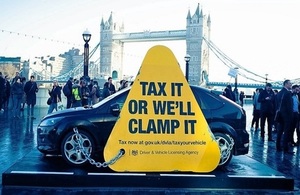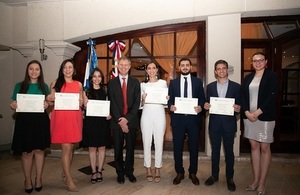DVLA hits the road with clear warning to tax it or lose it

The campaign is targeting the 20 regions of the UK where vehicle tax evasion is higher:
| Area | Total enforcement actions in 2019 |
|---|---|
| Belfast | 78,501 |
| Birmingham | 61,531 |
| Bristol | 24,747 |
| Cardiff | 28,857 |
| Coventry | 23,739 |
| Doncaster | 17,885 |
| East London | 26,005 |
| Edinburgh | 24,779 |
| Glasgow | 34,375 |
| Leicester | 23,174 |
| Manchester | 34,106 |
| Newcastle | 22,996 |
| Northampton | 18,729 |
| North London | 24,766 |
| Nottingham | 26,134 |
| Peterborough | 23,271 |
| Romford | 18,325 |
| Sheffield | 30,467 |
| South London | 29,336 |
| Swansea | 18,237 |
During 2019, DVLA took nearly 590,000 enforcement actions in these 20 regions against the keepers of untaxed vehicles.
The campaign will focus on showing the real consequences to those who don’t tax their vehicles – from penalties and fines to clamping, and ultimately losing their vehicle.
A giant clamp is at the centre of the campaign images, making it clear that DVLA takes action against untaxed vehicles on streets across the country every day, just like those in the image.
DVLA doesn’t need to spot an untaxed vehicle on the road to take action, but any vehicle spotted on the road that isn’t taxed, or is wrongly declared SORN, risks being clamped or impounded by one of DVLA’s enforcement teams. These teams travel in vehicles equipped with number plate recognition cameras, and are based around the UK to take action against untaxed vehicles.
DVLA’s Chief Executive, Julie Lennard, said:
The number of untaxed vehicles on the road is falling, but we are determined to reduce this even further. We operate a range of measures to make vehicle tax easy to pay and hard to avoid, so there really is no excuse if you fail to tax your vehicle. While the vast majority of motorists do the right thing and tax correctly, this campaign highlights the real consequences that motorists face if they don’t tax their vehicles.
RAC spokesman Simon Williams said:
While the vast majority of motorists abide by the law and tax their vehicles correctly, high-profile enforcement campaigns like this are needed to make sure the consequences of not doing so are fully understood. This DVLA campaign gives a very clear warning of the action that will be taken on untaxed vehicles. Having your vehicle clamped is expensive and inconvenient so it’s far simpler to make sure you tax it.
You can easily check when your tax is due using DVLA’s vehicle enquiry service on GOV.UK: all you need is your vehicle registration. It’s also really important to tell DVLA straightaway if you move house, so you don’t risk missing the reminder letters that DVLA sends to all vehicle keepers.
Motorists can go online, 24 hours a day, to tax a vehicle or check whether their vehicle tax is up to date. They can also check by asking Amazon Alexa or Google Home.
Notes to editors
-
The figures provided for the 20 campaign areas show the total number of individual enforcement actions – including late licensing penalties, out of court settlements and wheel clamping. These figures will include instances where more than one enforcement action has been taken against the same vehicle.
-
The Roadside Survey is the published Department for Transport record of untaxed vehicles spotted on the road. The latest figures (published in December 2019) show 98.4% of vehicles on the road are taxed correctly – decrease in evasion of by 0.2% on the figures from 2017.
-
If a vehicle is declared off the road (SORN) it must be kept off the road, on private land and it is an offence to use or keep a vehicle declared SORN on a public road. Find out more about SORN.
-
This campaign is targeting more densely populated regions of the UK with a significant number of vehicle keepers, and where we know we have taken higher levels of enforcement action in the past. The giant clamp will be on display 20 key areas across the country during the campaign, to highlight the consequences to motorists and the enforcement action being taken in these areas.
- The campaign will run on radio, print, out of home poster sites and digital channels.
- DVLA sends reminders to all vehicle keepers and renewal notices to Direct Debit customers.
- When DVLA clamps an untaxed vehicle the motorist is charged a £100 release fee. If they cannot show that the vehicle has been taxed when it is released the motorist will have to pay a surety fee of £160. This is refunded if the motorists can show the vehicle has been taxed within 15 days.
-
If the release fee is not paid within 24 hours DVLA impounds the vehicle and the fee rises to £200. There is also a storage charge of £21 per day. Again, a surety fee of £160 must be paid if the motorist cannot show that the vehicle has been taxed.
- Find out more about taxing a vehicle.
Last updated 18 February 2020 + show all updates
-
Welsh translation added.
-
First published.
